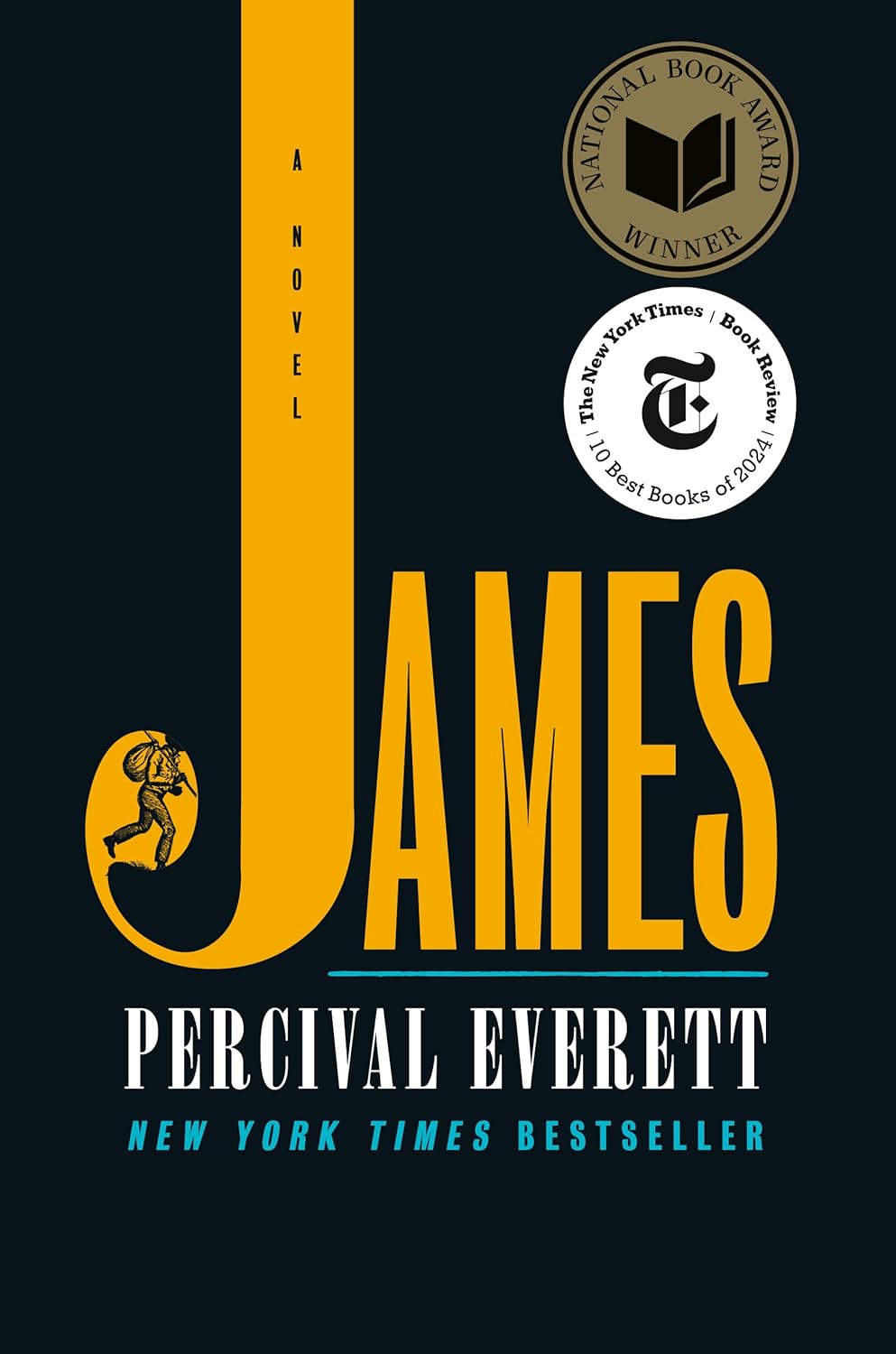
James: A Novel
“James: A Novel” by Percival Everett is a reimagining of Mark Twain’s “Adventures of Huckleberry Finn,” told from the perspective of Jim, the enslaved man who accompanies Huck down the Mississippi River. Everett subverts the original narrative by centering James’s voice, intellect, and agency, exposing the brutal realities of slavery and racial hypocrisy in 19th-century America. The novel explores themes of identity, freedom, and storytelling, blending sharp satire with poignant humanity. Everett’s masterful prose challenges historical narratives and offers a fresh, critical lens on a classic tale, making it a significant contribution to contemporary literature.
Description
- “James: A Novel” by Percival Everett is a reimagining of Mark Twain’s “Adventures of Huckleberry Finn,” told from the perspective of Jim, the enslaved man who accompanies Huck down the Mississippi River. Everett subverts the original narrative by centering James’s voice, intellect, and agency, exposing the brutal realities of slavery and racial hypocrisy in 19th-century America. The novel explores themes of identity, freedom, and storytelling, blending sharp satire with poignant humanity. Everett’s masterful prose challenges historical narratives and offers a fresh, critical lens on a classic tale, making it a significant contribution to contemporary literature.
FAQs
- What is James: A Novel about?
- • James: A Novel is a reimagining of Mark Twain’s Adventures of Huckleberry Finn from the perspective of Jim, the enslaved man who accompanies Huck down the Mississippi River. Percival Everett’s version offers a sharp, satirical, and deeply humanizing take on the original story.
- Who is the author of James: A Novel?
- • Percival Everett, an acclaimed American novelist, short story writer, and poet, is known for his provocative and genre-defying works. His writing often explores themes of race, identity, and social justice.
- What makes James: A Novel unique?
- • Unlike Twain’s original, Everett’s novel centers Jim’s perspective, giving voice to a character historically marginalized in literature. The book blends humor, wit, and biting social commentary, making it a fresh and thought-provoking read.
- Is James: A Novel suitable for fans of classic literature?
- • Yes, readers who enjoy classic American literature, particularly Twain’s works, will appreciate Everett’s inventive retelling. It offers a modern, critical lens on a well-known story while retaining its adventurous spirit.
- What themes does James: A Novel explore?
- • The book delves into themes of freedom, survival, racial injustice, and the power of storytelling. It challenges historical narratives while maintaining a compelling and engaging plot.
- Has James: A Novel received critical acclaim?
- • While specific reviews are unavailable here, Percival Everett’s works are widely respected in literary circles. Given the novel’s bold premise, it is likely to spark significant discussion and praise.
Quotes
- “At that moment the power of reading made itself clear and real to me.” — Percival Everett, James
- “Belief has nothing to do with truth.” — Percival Everett, James
- “I wanted to be certain that they were mine and not some I had read from a book in the judge’s library. I wrote: I am called Jim. I have yet to choose a name.” — Percival Everett, James
- “Everybody should read fiction… I don’t think serious fiction is written for a few people. I think we live in a stupid culture that won’t educate its people to read these things.” — Percival Everett
- “The calling out of logical fallacies. And so, after these books, the Bible itself was the least interesting of all. I could not enter it, did not want to.” — Percival Everett, James
- “I am called Jim. I have yet to choose a name.” — Percival Everett, James
- “Through his novel James, author Percival Everett brings forward a new voice from the classic American novel The Adventures of Huckleberry Finn, and challenges readers to experience this story from an incredibly challenging but important point of view.” — Libromaniacs.com
- Part One:Chapter 1 2,154 Words
- Part One:Chapter 2 2,077 Words
- Part One:Chapter 3 2,223 Words
- Part One:Chapter 4 2,075 Words
- Part One:Chapter 5 2,379 Words
- Part One:Chapter 6 2,417 Words
- Part One:Chapter 7 2,084 Words
- Part One:Chapter 8 2,150 Words
- Part One:Chapter 9 2,101 Words
- Part One:Chapter 10 2,247 Words
- Part One:Chapter 11 2,554 Words
- Part One:Chapter 12 1,776 Words
- Part One:Chapter 13 2,275 Words
- Part One:Chapter 14 2,339 Words
- Part One:Chapter 15 2,216 Words
- Part One:Chapter 16 2,551 Words
- Part One:Chapter 17 1,931 Words
- Part One:Chapter 18 2,123 Words
- Part One:Chapter 19 2,014 Words
- Part One:Chapter 20 1,991 Words
- Part One:Chapter 21 2,456 Words
- Part One:Chapter 22 2,103 Words
- Part One:Chapter 23 2,143 Words
- Part One:Chapter 24 1,969 Words
- Part One:Chapter 25 2,460 Words
- Part One:Chapter 26 2,319 Words
- Part One:Chapter 27 2,239 Words
- Part One:Chapter 28 2,120 Words
- Part One:Chapter 29 2,271 Words
- Part One:Chapter 30 2,215 Words
- Part One:Chapter 31 2,195 Words
- Part One:Chapter 32 2,701 Words
- Part Two:Chapter 1 2,343 Words
- Part Two:Chapter 2 2,131 Words
- Part Two:Chapter 3 2,366 Words
- Part Two:Chapter 4 2,209 Words
- Part Two:Chapter 5 2,206 Words
- Part Two:Chapter 6 2,261 Words
- Part Two:Chapter 7 2,015 Words
- Part Two:Chapter 8 2,234 Words
- Part Two:Chapter 9 2,013 Words
- Part Three:Chapter 1 2,102 Words
- Part Three:Chapter 2 2,210 Words
- Part Three:Chapter 3 2,348 Words
- Part Three:Chapter 4 2,315 Words
- Part Three:Chapter 5 2,052 Words
- Part Three:Chapter 6 2,198 Words
- Part Three:Chapter 7 2,209 Words
- Part Three:Chapter 8 2,158 Words
- Part Three:Chapter 9 2,049 Words
- Part Three:Chapter 10 2,007 Words
- Part Three:Chapter 11 2,211 Words
- Part Three:Chapter 12 2,053 Words
Quotes
“At that moment the power of reading made itself clear and real to me.”
— Percival Everett, James
“Belief has nothing to do with truth.”
— Percival Everett, James
“I wanted to be certain that they were mine and not some I had read from a book in the judge’s library. I wrote: I am called Jim. I have yet to choose a name.”
— Percival Everett, James
“Everybody should read fiction… I don’t think serious fiction is written for a few people. I think we live in a stupid culture that won’t educate its people to read these things.”
— Percival Everett
“The calling out of logical fallacies. And so, after these books, the Bible itself was the least interesting of all. I could not enter it, did not want to.”
— Percival Everett, James
“I am called Jim. I have yet to choose a name.”
— Percival Everett, James
“Through his novel James, author Percival Everett brings forward a new voice from the classic American novel The Adventures of Huckleberry Finn, and challenges readers to experience this story from an incredibly challenging but important point of view.”
— Libromaniacs.com
FAQs
What is James: A Novel about?
• James: A Novel is a reimagining of Mark Twain’s Adventures of Huckleberry Finn from the perspective of Jim, the enslaved man who accompanies Huck down the Mississippi River. Percival Everett’s version offers a sharp, satirical, and deeply humanizing take on the original story.
Who is the author of James: A Novel?
• Percival Everett, an acclaimed American novelist, short story writer, and poet, is known for his provocative and genre-defying works. His writing often explores themes of race, identity, and social justice.
What makes James: A Novel unique?
• Unlike Twain’s original, Everett’s novel centers Jim’s perspective, giving voice to a character historically marginalized in literature. The book blends humor, wit, and biting social commentary, making it a fresh and thought-provoking read.
Is James: A Novel suitable for fans of classic literature?
• Yes, readers who enjoy classic American literature, particularly Twain’s works, will appreciate Everett’s inventive retelling. It offers a modern, critical lens on a well-known story while retaining its adventurous spirit.
What themes does James: A Novel explore?
• The book delves into themes of freedom, survival, racial injustice, and the power of storytelling. It challenges historical narratives while maintaining a compelling and engaging plot.
Has James: A Novel received critical acclaim?
• While specific reviews are unavailable here, Percival Everett’s works are widely respected in literary circles. Given the novel’s bold premise, it is likely to spark significant discussion and praise.

